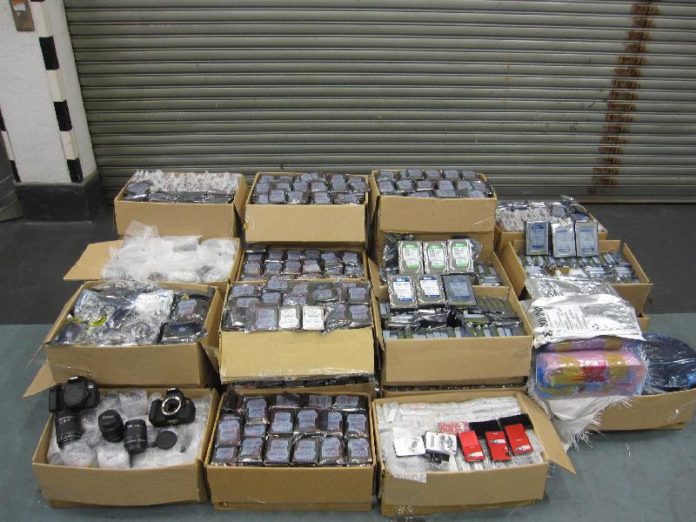‘As much as 59pc of total demand is met through illicit trade of smuggled goods’
ISLAMABAD: Customs Intelligence has confiscated Rs4 billion worth smuggled items during the first four months of the current fiscal year 2018-19.
According to Customs Intelligence high ups, the government’s anti-smuggling departments last year had confiscated Rs25 billion worth items, out of which the Customs portion was Rs11 billion. The confiscated items included smuggled clothes, narcotics, cigarettes, tires and other items, they informed.
The officials said that it was difficult to chain the monster of smuggling given the fact that the department only has 311 constables across the country.
A study conducted by the customs department in July this year revealed that 59 per cent of the total demand for products of over half a dozen sectors of the formal economy, including petroleum, tea, mobile phones and auto parts industry, was met through illicit trade of smuggled goods.
In 2014, the Model Customs Collectorate (MCC) Preventive, Karachi, investigated 13 commodities prone to smuggling in Pakistan. The collectorate came to the conclusion that illegal trade had adversely impacted 11 of the 13 commodities.
Customs Intelligence has confiscated Rs4 billion worth smuggled items during the first four months of current fiscal year 2018-19.
According to Customs Intelligence high ups, the government’s anti-smuggling departments last year had confiscated Rs25 billion worth items, out of which the Customs portion was Rs11 billion. The confiscated items included smuggled clothes, narcotics, cigarettes, tires and other items, they informed.
The officials said that it was difficult to chain the monster of smuggling given the fact that the department only has 311 constables across the country.
A study conducted by the customs department in July this year revealed that 59 per cent of the total demand for products of over half a dozen sectors of the formal economy, including petroleum, tea, mobile phones and auto parts industry, was met through illicit trade of smuggled goods.
In 2014, the Model Customs Collectorate (MCC) Preventive, Karachi, investigated 13 commodities prone to smuggling in Pakistan. The collectorate came to the conclusion that illegal trade had adversely impacted 11 of the 13 commodities.
The MCC Preventive, Karachi report, which was last updated in May 2015, stated, “Approximately 59pc of the demand for tyres was satisfied through illegal channels and may have been met through smuggling.”
“Around 47pc of the demand for tea was satisfied through illegal channels,” it stated and added the share of smuggled mobile phones in the total demand stood at 59pc, while the rest was met through formal imports, as the country does not domestically produce cellular phones.
The report stated, “The share of smuggled televisions stood at 57pc, while the rest of the demand was met through domestic production (37pc) and imports (6pc).”
The share of smuggled auto parts in the total demand stood at 57pc, while the rest of the demand was met through domestic production (18pc), imports (16pc) and counterfeit (9pc). Around 10pc demand for steel sheets is met through smuggling, 87pc though formal imports, while rest is met through domestic production.
Similarly, 12pc demand for vehicles is met through smuggling, 67pc through domestic production and remaining 21pc through formal imports. The prevailing demand for fabrics was met through 17pc smuggling, 58pc domestic production and the rest 25pc through imports, while the smuggling of diesel carries a share of 33pc.
Cigarettes meet 3pc demand and plastic granules meet 11pc through smuggling, the report said.
Transit trade to the neighbouring landlocked state Afghanistan has played a key role in promoting illegal trade with Pakistan, it added.




